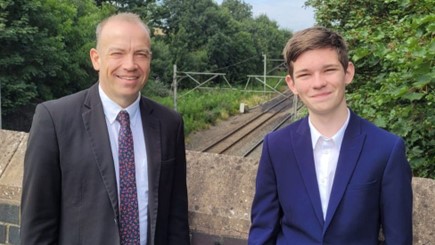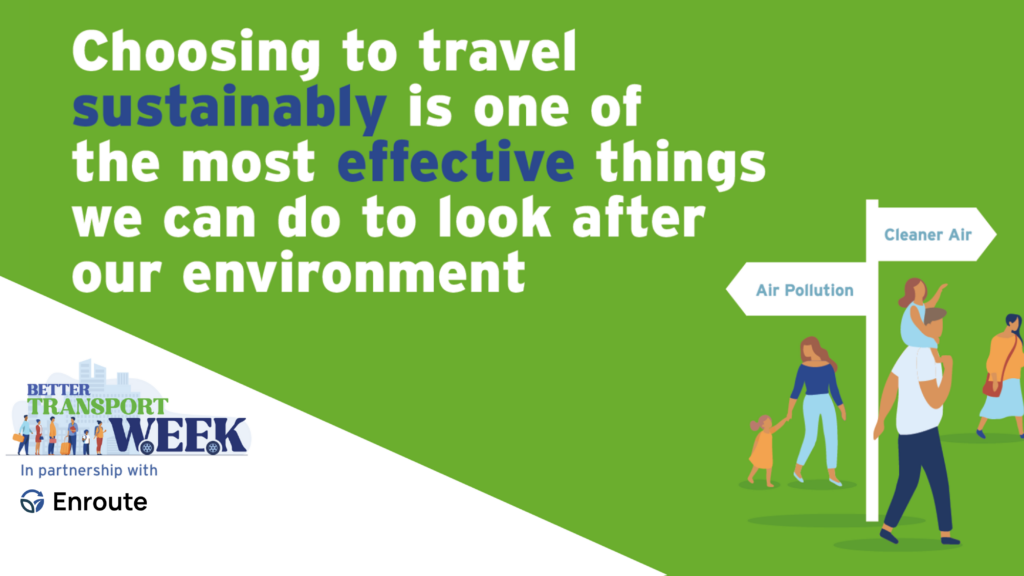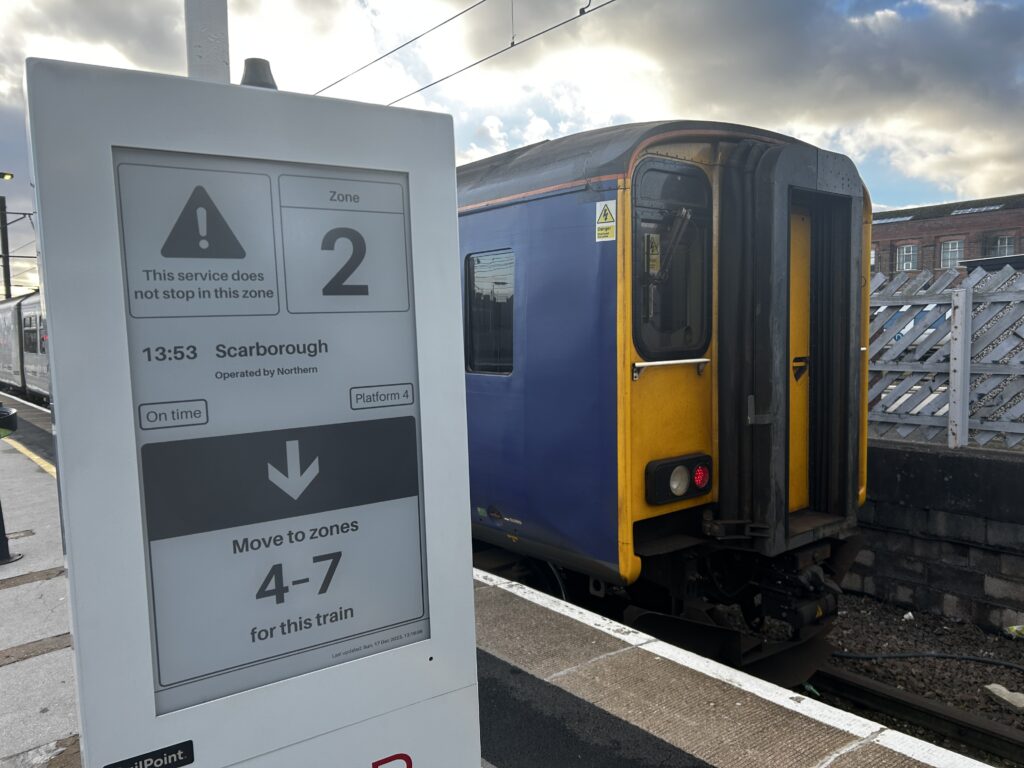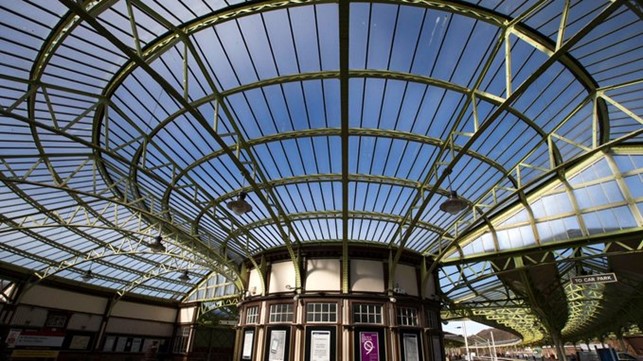I’m Harry Burr, a transport planner, advocate, and proud founder of Enroute. I’m commonly asked what got me into this sector, what got me into campaigning at such a young age, and how I got to where I am today.
If I were to go all the way back, I was born in Margate, East Kent (although the accent doesn’t sound very Margate, I know), and lived in Birchington-on-Sea for seven years. Of course, it’s the south east, and we had very high quality rail links – it was my primary way of getting around with my parents, while dad had the car at work.

We moved up to Northampton in 2013, to live on two narrowboats, explaining my usual background with a wood-burning stove in the background while I’m on Board calls and client meetings!
It didn’t take me very long to realise the transport network really isn’t that great, even at my young age, whether that be having to put up with a bus every two hours while we had problems with our car back in 2016, or having to pick nan and grandad up from Northampton station rather than Long Buckby since it has no step-free access.
But you’d be surprised that I didn’t grow up wanting to get into transport or rail, although I did like getting the train. I was actually really into technology as a young child, learning tools like WordPress, Office and using the Linux command line on a little Raspberry Pi 3 as young as 11. Once again, explains why Enroute now has such good IT services!
So where did transport really come into play? Well, it actually started in late-2019, when the boats were moored in Rothersthorpe, right next to the West Coast Main Line via Weedon, and I started to notice that the Virgin Trains Pendolinos I’d have got used to seeing, had started to turn white.
As the curious 13-year-old I was, I started to research why, and got into the never-ending world of franchising and franchise contracts, to of course find out that Avanti West Coast was taking over the franchise from Virgin at that time. This curiosity seemed to continue for quite a while, until bam, COVID came and the country was put into lockdown.
I was in Year 9 at secondary school at this time, and was admittedly very bored, since schools didn’t have contingency for a national lockdown. The boats happened to be in Weedon Bec during this time and I was on the Junior Parish Council (JPC), a unique arrangement that sat alongside the elected Weedon Bec Parish Council.
I realised while being here that Weedon was a relatively large village with a population of around 3,000, yet didn’t have a station on the West Coast Main Line. I was no means a transport planner (back then anyway!) so didn’t understand the other, much larger, business case for a station at Weedon Bec. We’ll get onto that.
Initially as part of this role, I launched what was then the Weedon Station Project, with the tagline Getting Weedon Connected, as a whitepaper with a website. Now I look back at the report, it was very basic, but then I remember I was 13 years old and now I’m (nearly) accredited to write these things for a living.

My old primary school headteacher got a hold of this and asked me if it was okay if he could drop it to the local and regional press, which he did, and this was my first experience of being in the media. The campaign really did pick up from there, and contact took place with my local MP and Rail Minister Chris Heaton-Harris, as well as councillors within, at that time, Daventry District Council.
However, one of the most important people that got in touch with me was Owen O’Neill, the founder of the Welland Valley Rail Restoring Your Railway (RYR) fund bid and ongoing programme, who offered some really valuable knowledge to me, including the concept of parkway railway stations.
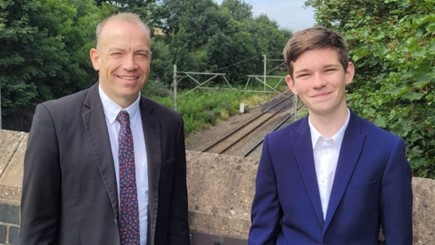
This resulted in Weedon Station Project becoming ‘Daventry Parkway Project’, with me understanding the fact that Daventry is actually one of the largest towns in the UK without a railway station, at around 25,000 people. It’s only served by Long Buckby at the moment, which, as I alluded to earlier, really isn’t a great station. It’s now my daily commute – I didn’t imagine that four years ago!
So, so, so much then happened in between Daventry Parkway and Enroute. So much that I’m just going to bullet point it down:
- In late-2020, I formed Sustainable Transport Northamptonshire (STN), a transport campaigning group.
- We launched STN’s second campaign, Lutterworth Line, in early-2021, which went on to bid for funding from the Restoring Your Railway fund, unfortunately unsuccessfully.
- Considering Lutterworth is not in Northamptonshire, we understood that we would be facing this issue for a while. Therefore, I rebranded the organisation to Sustainable Transport Midlands in mid-2021.
- We appointed our first volunteer, Thomas Haines, in mid-2021, and later in the year, a Scrutiny Committee for the organisation. I also appeared on BBC News and BBC Look East.
- In mid-2021, I also carried out work experience with SLC Rail and Network Rail, a very exciting experience for me, which sold the transport industry to me for my future career. I was appointed Young Persons Ambassador at the Rail Forum and spoke at their Annual Conference later in the year.
- In late-2021, after a discussion with Network Rail, I took the decision to reshape Daventry Parkway Project into the Daventry Transport Development Group (DTDG), looking at wider options to improve sustainable transport in the town.
- In early-2022, I was appointed as Project Director for DTDG, and we had our first Stakeholder Committee meeting with the new local authority West Northamptonshire Council, parish councils, and the West Midlands Rail Executive.
- Throughout 2022, I continued to maintain our work on the Daventry Parkway Project campaign, and our small team explored other potential projects throughout the Midlands, such as a rail link to East Midlands Airport and a tram network in Derby.
- In mid-2022, I was offered a transport planning apprenticeship by a major engineering consultancy in Birmingham, ticking off my publicly known ambition to work as an apprentice in the rail industry once I finished my GCSE’s.
- In late-2022, we appointed George Marshall and David Frankal to a new project development and management team, who worked tirelessly to develop ‘Concept Outlines’ for potential campaigns to run in the future.
- Throughout 2023, Sustainable Transport Midlands saw unseen team growth, while we launched no new campaigns. We came to the conclusion that running major infrastructure campaigns would take more than volunteers, and in August 2023, decided to change tactic and become Enroute in December 2023.
- We worked tirelessly for the rest of the year, with pressure taken off of me by David Frankal, who stepped up to joint run the company with me.
- Enroute finally launched in December 2023.
It’s been one hell of a journey, but I wouldn’t change it for the world.
Read some of our other blog posts

